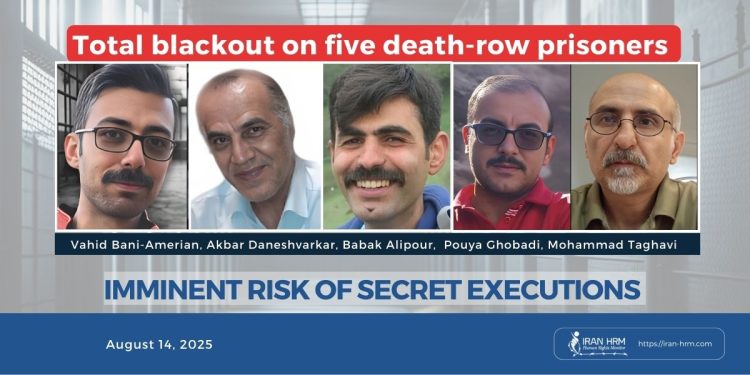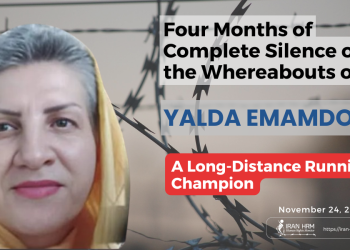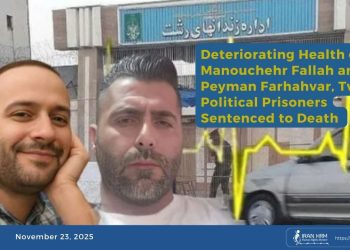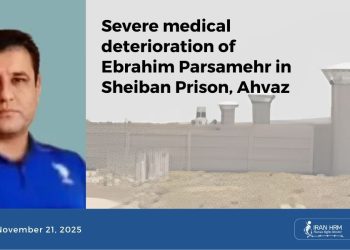Introduction
More than a week after the violent transfer of five political prisoners on death row—Vahid Bani-Amerian, Pouya Ghobadi, Akbar (Shahrokh) Daneshvarkar, Babak Alipour, and Mohammad Taghavi—there is a total blackout about their whereabouts or condition. On Friday, 8 August 2025, during a mass transfer from Greater Tehran (Fashafouyeh) Penitentiary to Evin, the five were separated from the others and taken to an undisclosed location.
While officers initially named Qezel Hesar Prison as the destination, officials there later denied any knowledge of their presence. This denial—combined with a total cut-off of communication and the authorities’ failure to respond to families—amounts to enforced disappearance. This case exemplifies total blackout, five death-row prisoners, Qezel Hesar secure ward, secret execution and stands as one of the most serious instances of enforced disappearance in recent years.
Incident details
Witnesses report the five prisoners were moved under heavy guard amid intimidation, beaten during separation, and given no opportunity to call their families. Multiple informed sources state that prison personnel threatened others to block any flow of information. From the moment of separation, the men were completely isolated from the outside world; their physical and mental condition remains unknown.
Qezel Hesar and its “secure ward”: a “killing factory”
Qezel Hesar’s so-called secure/special wards are widely known among prisoners as a “silent slaughterhouse” for opponents. Tiny solitary cells, total denial of contact with family and counsel, a high concentration of death-row prisoners, and the use of torture halls colloquially form part of the grim reality. Documented patterns show these wards are not about protecting security; they are tools of isolation and preparation for secret executions. The recent cases of Behrouz Ehsani and Mehdi Hassani—transferred under similar conditions and executed without prior notice to family or lawyers—underscore the mortal danger facing these five men.
Families’ protests
Families have appealed publicly through messages and videos, demanding immediate disclosure:
- Family of Vahid Bani-Amrian: “Where are our children? It’s been a week since they were taken. We are not told anything and they are not allowed to call. We are terrified for them.”
- Sister of Shahrokh Daneshvarkar: “We have had no news since 5 Mordad. They are denied phone calls. If they are safe, where are they? Why are the judicial authorities not answering us?”
Despite repeated visits to judicial offices and formal letters to the Prosecutor’s Office and the Prisons Organization, families report no clear response.
International reactions and support
Amnesty International, Iran Human Rights, the German Solidarity Committee for a Free Iran (statement), the UN Special Rapporteur on the situation of human rights in Iran and the UN Human Rights Council, and the British Committee for Iran Freedom (call to the UK Government)—alongside public figures such as Brad Sherman (U.S. Congress) and Sharron Davies (Olympic champion)—have all warned of the imminent risk of execution and urged immediate global action.
Legal analysis
Concealing the place of detention violates Articles 9, 10, and 14 of the International Covenant on Civil and Political Rights (ICCPR), and the International Convention for the Protection of All Persons from Enforced Disappearance. Enforced disappearance is a continuous violation that persists until the person’s fate and whereabouts are disclosed. It places the victim at heightened risk of torture and extrajudicial execution. No emergency or security pretext can justify it. The ruling regime in Iran is obligated under international law to end these practices immediately and ensure access to counsel, family contact, and human treatment for all detainees.
A dangerous pattern, not an accident
In Iran’s prison system, enforced disappearance and transfers to Qezel Hesar’s secure wards have repeatedly preceded executions. In the cases of Ehsani and Hassani, an initial blackout ended in secret execution. The current blackout is thus not an isolated anomaly but part of a systematic policy to eliminate political opponents while evading scrutiny and due process.
Urgent call to action
We call on the United Nations, the Human Rights Council, the UN High Commissioner for Human Rights, the UN Special Rapporteur on the situation of human rights in Iran, the European Union, and concerned governments and human rights organizations to:
- Press the authorities to immediately disclose the whereabouts and condition of Vahid Bani-Amerian, Pouya Ghobadi, Akbar (Shahrokh) Daneshvarkar, Babak Alipour, and Mohammad Taghavi, and to guarantee their safety.
- Demand an immediate halt to all executions—especially those issued after unfair trials—and the suspension and review of these death sentences.
- Secure prompt, confidential access to independent legal counsel and unrestricted family contact for the five prisoners.
- Dispatch independent fact-finding missions to Qezel Hesar, with private interviews of prisoners and staff, free from the presence of security personnel.
Conclusion
The total blackout over the fate and location of these five death-row political prisoners is a red alert for another crime behind the walls of Qezel Hesar. Past experience shows only immediate public pressure from the international community can stop secret executions. The mullahs’ regime bears direct responsibility for protecting these men’s lives. Silence in the face of this crime is complicity. This situation reflects a silent slaughterhouse and highlights the role of the UN Special Rapporteur on human rights in Iran and UN Human Rights Council in demanding urgent action from the global community.







